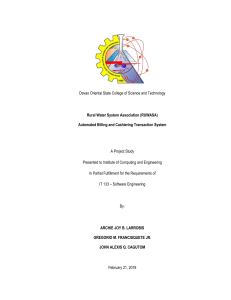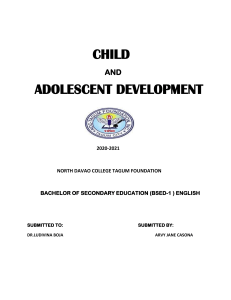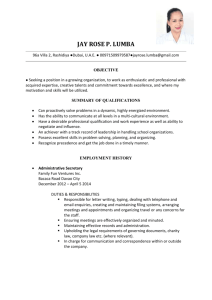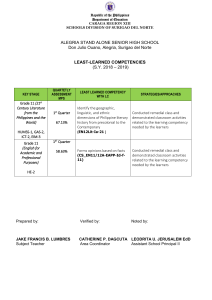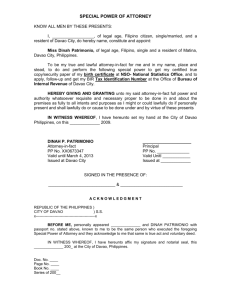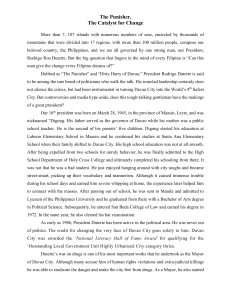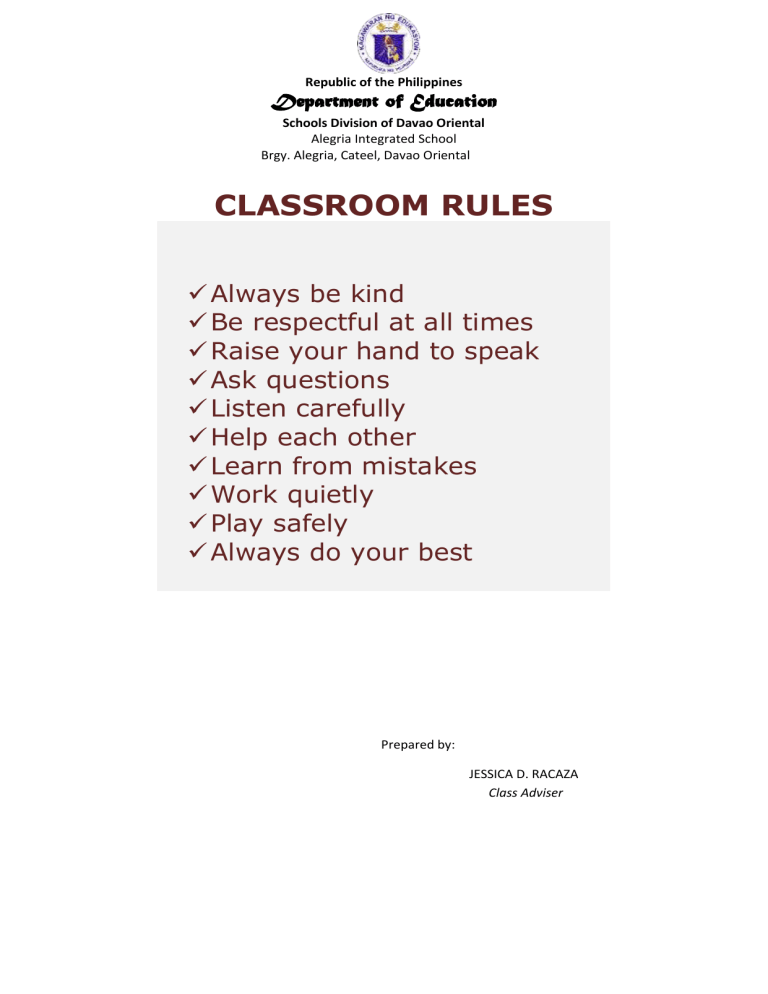
Republic of the Philippines Department of Education Schools Division of Davao Oriental Alegria Integrated School Brgy. Alegria, Cateel, Davao Oriental CLASSROOM RULES Always be kind Be respectful at all times Raise your hand to speak Ask questions Listen carefully Help each other Learn from mistakes Work quietly Play safely Always do your best Prepared by: JESSICA D. RACAZA Class Adviser Republic of the Philippines Department of Education Schools Division of Davao Oriental Alegria Integrated School Brgy. Alegria, Cateel, Davao Oriental The 12 Rights of Filipino Children 1. Every child has the right to be born well. It is the responsibility of the parents to make sure they can provide a safe environment for their unborn child. This includes proper medical attention and care from conception, birth, and throughout childhood years in a newborn services unit or pediatric center. 2. Every child has the right to a wholesome family life. The child’s first learning environment and teachers are their home and family. They are entitled to be a part of a loving family that will instill ethical values and morals in them. 3. Every child has the right to be raised well and become contributing members of society. By raising them in a safe and loving environment, parents and guardians can shape the personalities of their young to be useful and contributing members of their respective communities when they grow older. 4. Every child has the right to basic needs. The four basic needs of people outlined in the law are as follows: a balanced diet, adequate clothing, sufficient shelter, and proper healthcare. This also includes any other requirements to lead a healthy and active life. 5. Every child has the right to access what they need to have a good life. This right goes beyond the basic needs and focuses more on the atmosphere of the place they will be raised in. A child’s needs must always be attended to so they feel the support of people around them, which in turn will build and strengthen their character in adulthood. 6. Every child has the right to education. In an ideal world, every child should have the means to go to a classroom and have access to books and learning materials that can enrich their intelligence and skills. 7. Every child has the right to play and enjoy their youth. Children have the right to engage in wholesome recreational activities whenever they wish and not be exploited for events that are deemed only for adults to do, i.e., intensive manual labor. 8. Every child has the right to be protected from danger. This includes all hazards that could affect their physical, mental, and emotional states, such as removing them from dangerous living situations, preventing them from getting into accidents, or protecting them from the abuse of adults, to name a few. 9. Every child has the right to live in a productive environment. Children should be surrounded by safe communities that inspire them to give back when they are older. This means staying away from bad influences and situations that can cause harm to their health. 10. Every child has the right to be cared for in the absence of their parent or guardian. If the parent or guardian fails to fulfill their role, the State shall assume custody and care for the child, providing them with their fundamental needs for growth and development. 11. Every child has the right to good governance. Children also have a right to be born under the presence of good governance that can inspire them to become a helpful and active citizen. This doesn’t necessarily mean they have to get involved with politics but rather have an interest in being involved in political discussions for the betterment of their country. Republic of the Philippines Department of Education Schools Division of Davao Oriental Alegria Integrated School Brgy. Alegria, Cateel, Davao Oriental 12. Every child has the right to freedom and peace. Last but not the least, every child is entitled to do whatever they want in their lives, so long as it contributes to the peace and betterment of the communities they are a part of. Protect Children’s Rights Every Day Parents, guardians, and all adults should be vigilant in protecting and advocating for the rights of children. While this National Children’s Month is a gentle reminder for everyone to ensure that they are creating a better world for young Filipinos to live in the future, the battle must not stop at the end of November. Let’s continue to be great examples to kids and be conscious of our actions in making the Philippines a safe environment for them to take care of and pass on to future generations! Classroom policies 1. Come to class prepared to learn Always come to class with complete preparation for learning. This includes taking all important materials needed for the day like textbooks, notebooks, pencils and pens, geometry boxes, lunch bags, and water. If the teacher has asked to prepare some lessons for the day, make sure that you do it before reaching the classroom. Also, have a look at the days’ time to not miss any subject books. 2. Don’t ever cheat It is not recommended to cheat in the classroom in any circumstances. You should keep moral values such as honesty always. It is not a big deal to fail in exams at times but succeeding by cheating is never tolerable. Also, it is not advisable to lie to anyone and always speak the truth. 3. Always be on time Punctuality is one of the best qualities to be developed right from school days. Be warned about the starting time of your class and start from home early to reach before time. Develop a routine to reach school before the bell rings and be seated in your classroom position before the warning bell. 4. Be attentive to teachers while teaching It is mandatory to give your full attention to the classroom while teachers are taking classes. You can relax during break times and be dedicated to listening while teaching is going on. This will help you to not miss any lesson areas and ask any doubts about the teacher straight away. 5. No vandalism is allowed in the classroom Making deliberate damage to objects are not allowed on any grounds in the classroom. Understand that the chairs, desks, blackboard, and cabinets in the classroom are common Republic of the Philippines Department of Education Schools Division of Davao Oriental Alegria Integrated School Brgy. Alegria, Cateel, Davao Oriental properties. Always handle it with care and not even scribbling in desks is allowed. Have a feeling that these objects are to be reused by the next batch of students and it is your responsibility to give it clean to them. 6. Be well dressed in complete uniform Always come to the classroom in complete uniform as described in school policy. It is good to plate your hair if you have a long one and avoid jewelry. Make sure that dresses are washed properly and socks are changed daily. Coming to classroom presentable can help you stay fresh day long. 7. Respect your body You should understand that your body is your responsibility and you should respect it. Never ever allow somebody to touch your body without your consent. There are many bullying reported among school students. If you experience any such incidents, straight away tell your parents and report to the teacher. 8. Keep your classroom clean It is your responsibility to keep your classroom clean. It is not advised to litter your classroom premises but make use of trash cans for dumping wastes. See that you don’t spill food or water during lunchtimes and get assistance from cleaning staff if you notice any such dirt. 9. Don’t ever distract the class during lessons Students should see that they never distract the class during teaching through any means. Even sharpening the pencil in pin-drop silence in a classroom can distract the teaching flow. Never walk around the class during lessons and avoid talking to other students. If you have anything to ask the teacher, just raise your hand to ask permission before you speak. 10. Maintain good personal body hygiene It is the most important to maintain personal hygiene while you are in class and always. Take a daily shower in the morning before class and evening also to stay fresh. Wash your hands properly before and after having food and use handkerchief while you sneeze. 11. Complete home works and assignments daily It is the responsibility of students to come to class after completing the daily home works and assignments. Instead of rushing to the classroom in the morning and doing in a hurry or copying from others, always do it the night before. Be systematic on revising the daily lessons and preparing for the next day’s lessons. 12. Actively participate in classroom activities There will be a lot of activities and classroom games as part of learning. Republic of the Philippines Department of Education Schools Division of Davao Oriental Alegria Integrated School Brgy. Alegria, Cateel, Davao Oriental Every student should voluntarily come up to actively participate in all of them and never stay behind. This is the age where you have to polish your potentials and never say ‘no’ if the teacher asks you to take up some small responsibilities. 13. Respect other students’ personal belongings Just like you value your personal belongings, it is equally important to value other students’ belongings too. Don’t take other’s belongings without their permission and take proper care of it if you happen to use them with their permission. 14. Comply with all school policies on handbook You should sit with your parents to learn about the school policies written on the handbook before the first day of the school itself. You are supposed to always comply with all these policies under any circumstances. Have a talk with the teacher if you have doubts or concerns regarding any of the guidelines. 15. Follow the directions during activities There will be a lot of classroom activities happening place during the learning sessions. This can include games, debates, quiz etc. Students are supposed to follow all the directions put forward by teachers or organizers and always be fair throughout the sessions. 16. Respect views of others Just like you have an opinion about something, others might have a different view or perception. You should be always polite to listen to others’ views and respect them rather than enforcing your particular view. This can be more evident when you take part in classroom debates. 17. Be kind always Students should learn to be kind right from the school days. You should help people in need whenever possible and don’t miss any opportunities in front of you to shower kindness. You should grow up by caring for each other and helping each other. 18. Always do your best Always maintain a positive attitude in life and do your best despite what all obstacles life offers you.
